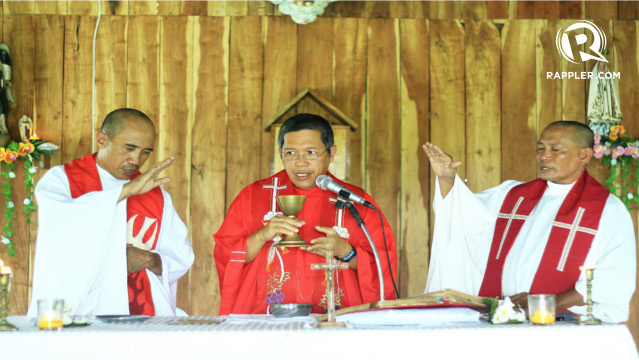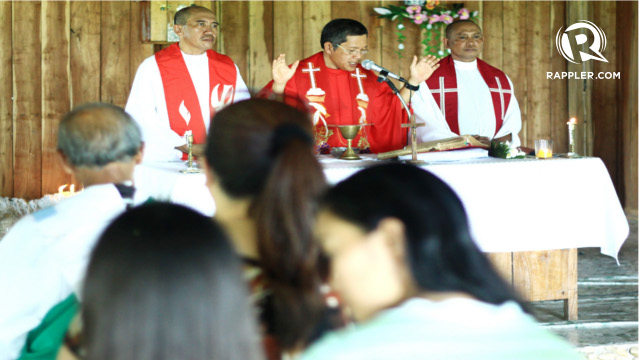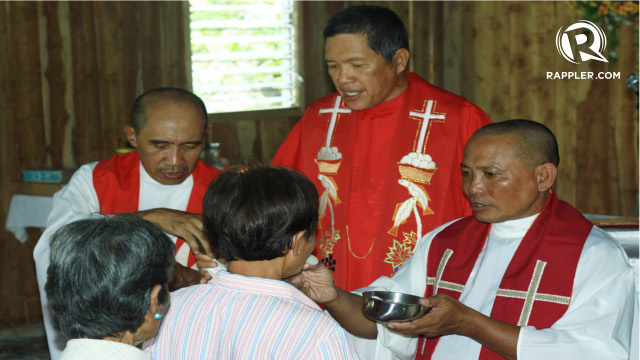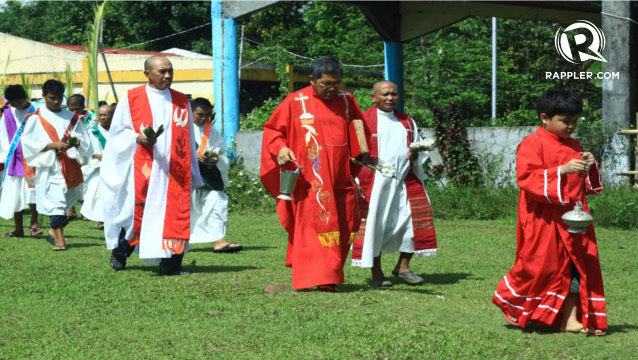SUMMARY
This is AI generated summarization, which may have errors. For context, always refer to the full article.

ILOILO CITY, Philippines — In time for Easter weekend, 3 Catholic Ilonggo priests with families renewed their call for optional celibacy.
“Priesthood and marriage are not a contradiction. Marriage blends with priesthood,” said Fathers Hector Canto, Jose Elmer Cajilig, and Jesus Siva in a joint statement.
The 52-year-old Canto is married with 3 children, while 51-year-old Cajilig and 52-year-old Siva are both unmarried priests who have children.
The 3 are hopeful that Pope Francis may be able to hear their plea to make celibacy optional in the Roman Catholic priesthood, which was hopeless during the papacy of Pope Emeritus Benedict XVI, who affirmed the celibacy rule in several theological writings.
A congregation of their own
For almost 15 years, the 3 priests have continued their priestly functions despite having been publicly denounced by the country’s Roman Catholic hierarchy.
Canto, Cajilig and Siva even formed Companiya De Los Padres De Pamilya, which they consider as a congregation akin to the Augustinians, Dominicans, Franciscans, Jesuits, or Recollects.
“If the universal Church will not accept optional celibacy, at least the Church would accept our congregation,” they said.
As Companiya De Los Padres De Pamilya, they have established a Catholic community in a mountainous village in the town of Lambunao in Iloilo province.
The Shrine of Mount Zion is where they hold weekly Sunday masses and where they feel the villagers have accepted them.

Aside from the weekly Sunday masses, they also perform other priestly functions both in the city and province of Iloilo. It includes baptism, burial, confirmation of marriage, or thanksgiving rites to open-minded Catholics.
For them, the requests to perform Catholic rites are a living testament of an increasing social awareness and social acceptance.
The Divine
Contrary to notions of Roman Catholics, the 3 firmly believe that celibacy has never been a Divine rule.
They pointed out a historical fact that priests were married when the Church began and it stayed that way for more than 1,000 years. Peter, the apostle who became the first Pope, was married with children.
The rule of celibacy was later adopted to give the clergy focus on their ministerial functions, which would not be as efficient if they have families.
Canon Law
More importantly, the 3 are relying on the Canon Law as they continue their priestly functions.
Citing Canon 290, they strongly believe that their ordination to the priesthood will never become invalid. They also cited Canon 1335 that gives them the authority to administer sacramental rites when the faithful request them.
“Which law are we going to follow? Isn’t it the Canon Law?” they pointed out.

The Canon Law also became the basis for the optional celibacy movement established in Iloilo in May 1998.
It was on the day when Canto married his wife wearing his cassock. The marriage ceremony officiated by Siva was widely publicized and shocked the country’s Catholic community. The marriage ceremony also led to the suspension of both Canto and Siva by then Jaro Archbishop Alberto Piamonte.
On his part, Cajilig has been on indefinite leave since 1997 when he left his last assigned diocese.
The challenge
Canto, Cajilig, and Siva renewed the challenge to priests or former priests with families to go back to their calling. “Let’s continue celebrating the holy eucharist,” they said.
But the Ilonggo president of the Catholics Bishops’ Conference of the Philippines (CBCP) strongly disagreed. “They have nothing to prove,” said Cebu Archbishop Jose Palma, who hails from the component city of Passi and Dingle town of Iloilo province.
Palma emphasized that those who have left the priesthood to build their families cannot go back. It is, according to him, unfair for those who have chosen to build families to tell the clergy to choose optional celibacy.
“When you entered the seminary, you knew you will be leading a celibate life,” Palma noted.
Palma added that he has aided, through the legal way of leaving priesthood, the priests who have asked for dispensation.

“They can just say that they were a priest once, and now they’re out. It should give them a peace of mind,” Palma said.
The CBCP president also pointed out that priests who have families could have chosen to join the Eastern Orthodox Church. Detached from the Vatican, Orthodox priests are allowed to marry. However, Orthodox bishops have to remain celibate.
But for the 3 Ilonggo priests with families, the Vatican must be able to address this, especially at a time when the Roman Catholic clergy is facing sex scandals.
Canto, in particular, expressed fear that the Catholic faithful may become detached from the Church and eventually lose their faith. – Rappler.com
Add a comment
How does this make you feel?
There are no comments yet. Add your comment to start the conversation.